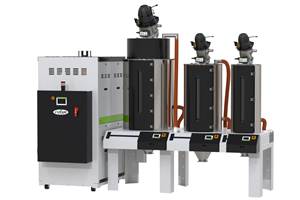PET Dryer Is Said to Cut Energy Use by 67%
A new method of recycling hot exhaust air back into the drying hopper of a wheel-type desiccant-rotor dryer is said to reduce energy consumption in high-volume PET processing by up to 67% relative to other desiccant dryers.
A new method of recycling hot exhaust air back into the drying hopper of a wheel-type desiccant-rotor dryer is said to reduce energy consumption in high-volume PET processing by up to 67% relative to other desiccant dryers. Substantial energy savings reportedly were verifi ed in beta testing by a large PET bottle maker of the new EnergySmart system from Conair, Pittsburgh. This system is an add-on option to the Carousel Plus desiccant-rotor dryer. Because it adds some complexity and expense, the EnergySmart option is recommended mainly for processors running large volumes (800 lb/hr or more) of hygroscopic materials that require drying at temperatures above 250 F. Besides PET, suitable applications could include polycarbonate sheet or film extrusion. In PET preform and bottle molding, resin is dried at 300 to 350 F for 4 to 6 hr in hoppers holding thousands of pounds. In a standard PET dryer, exhaust air leaving the hopper is still quite hot-around 200 F. Because the desiccant is less able to remove moisture at such temperatures, the air must pass through a water-cooled heat exchanger to drop the temperature to about 120 F. Thus about 80° F of heat energy is wasted. What's more, the air must be reheated to 350 F after it passes through the desiccant but before it reenters the drying hopper. Conair's EnergSmart system reduces this waste by means of a twostage system incorporating a hot-air drying circuit and a dehumidifi ed air circuit. Some of the 200 F return air leaving top of the drying hopper is channeled through a dust fi lter and then reheated to 350 F before it is reintroduced to the drying hopper via a special inlet cone in the center of the hopper about halfway from the bottom. "This recycled air is not quite as dry as normal drying process air," explains Pete Stoughton, PET sales manager. "Its dewpoint is between -20 and 0°F instead of the -40 F resin manufacturers recommend. But the main function of the recirculated hot air is to preheat the polymer in the top half of the hopper to the drying temperature." The low-dewpoint drying air required for PET is supplied by the EnergySmart system's dehumidifi ed air circuit. That -40 F dewpoint air is heated to 350 F and introduced to the center of the hopper at the bottom through an inlet cone in the tube-intube air distribution system. "Because we have preheated the PET to the drying temperature in the hot-air section of the hopper," says Stoughton, "we need a considerably smaller volume of desiccated air in the dehumifying zone. We need less energy to heat a smaller volume of air, and we can use a smaller dryer." Conair says this system can save $3.05/1000 lb of PET, based on an electricity cost of 5.5¢/kwh. The volumes of recirculated hot air and dehumidifi ed air are adjusted in the EnergySmart system by the Conair Drying Monitor. A long probe in the drying hopper has six temperature sensors to monitor different zones. The hopper temperature profi le is continuously displayed on the operator screen. Tel: (412) 312-6000 . www.conair.com
Conair
One Conair Dr. Pittsburgh, PA 15202
Phone (412) 312-6000 Fax (412) 312-6320
Related Content
ACS Group Adds Regional Sales Manager
Richard Gutierrez named Southwest regional sales manager.
Read MorePiovanGroup Rebrands, with Mostly Minor Name Changes
For the most part, subsidiary company names will remain, with slight modifications meant to enhance the Group’s identity.
Read MoreConair Names New Head of Customer Care
Jared Helfrich to direct the efforts of the machine builder’s growing customer care group, combining its existing parts and service and repair organization with a new range of fast-growing customer services.
Read MoreAI Manages Resin Drying Airflows and Throughputs for Energy Savings
NPE2024: Optional feature automates the process of maintaining process-ready resins at perfect temperatures and varied throughputs, while preventing overdrying and realizing significant energy savings.
Read MoreRead Next
See Recyclers Close the Loop on Trade Show Production Scrap at NPE2024
A collaboration between show organizer PLASTICS, recycler CPR and size reduction experts WEIMA and Conair recovered and recycled all production scrap at NPE2024.
Read MorePeople 4.0 – How to Get Buy-In from Your Staff for Industry 4.0 Systems
Implementing a production monitoring system as the foundation of a ‘smart factory’ is about integrating people with new technology as much as it is about integrating machines and computers. Here are tips from a company that has gone through the process.
Read MoreMaking the Circular Economy a Reality
Driven by brand owner demands and new worldwide legislation, the entire supply chain is working toward the shift to circularity, with some evidence the circular economy has already begun.
Read More










